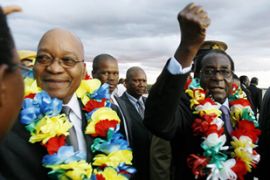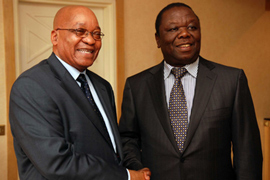Zuma meets Zimbabwean leaders
South African president holds one-on-one talks in a bid to resolve unity government tensions.

Zuma held one-on-one talks with Mugabe and then with Tsvangirai on Wednesday. The three men were expected to meet early on Thursday.
Both Mugabe and Tsvangirai refused to make comments as they left the talks, saying only that the meetings had gone “very well”.
No breakthrough
Patrick Chinamasa, Mugabe’s lead negotiator, held out little prospect for an imminent breakthrough, saying lower-level talks were already planned for next week.
“It will not be the end of the matter. We should meet as negotiators and conclude our negotiations, which we will do later this month,” he said.
Haru Mutasa, Al Jazeera’s correspondent in Harare, said: “What seemed to annoy President Mugabe was that some people are on Zuma’s visiting agenda that he thought would not be on the agenda.
 |
| Tsvangirai, right, has complained of not being involved in the governing process [AFP] |
“Some are civil society members and, of course, a key issue is that Jacob Zuma will meet Roy Bennett, the man currently on trial on charges of treason.
“[Mugabe’s] Zanu-PF party officials say that he tried to assassinate President Mugabe, and he has still not been sworn in as deputy minister of agriculture – a sticking point with the MDC [Movement for Democratic Change].”
The unity government halted Zimbabwe’s spectacular economic collapse, erasing hyperinflation and posting the first growth seen in more than a decade.
But Tsvangirai has complained that Mugabe made a series of top-level appointments unilaterally and that supporters of his MDC party remain the target of official persecution.
Mugabe, in power since independence from Britain in 1980, has bitterly insisted that Western nations lift a travel ban and asset freeze imposed on his inner circle before making more concessions.
Under the power-sharing deal, Zimbabwe was meant to draft a new constitution and put it to a referendum by November 2010, with new elections by February 2011.
Public consultations on the constitution were meant to start nine months ago, but are now only expected to begin in April.